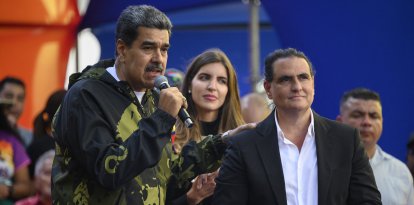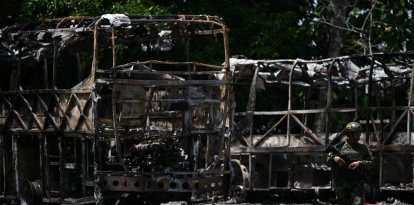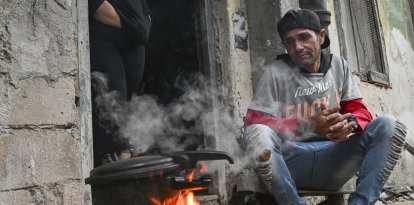OAS and European Union countries sign resolutions to condemn human rights violations and Maduro's electoral fraud in Venezuela
More than twenty countries joined to demand electoral transparency and respect for fundamental rights, condemning the recent actions of the Venezuelan dictatorship.

Nicolas Maduro speaking during a campaign rally in Caracas.
At a time of growing international concern over the situation in Venezuela, the Organization of American States (OAS) approved by consensus a resolution condemning electoral fraud and repression under the regime of Nicolas Maduro.
The initiative, pushed by the United States, demands respect for human rights, the will of the electorate and impartial verification of the results to ensure the transparency and legitimacy of the electoral process.
The resolution comes after the presidential elections held on July 28, 2024, widely questioned for irregularities. Given this scenario, the OAS reaffirms its commitment to democracy in the region, stressing the importance of the peaceful participation of the Venezuelan electorate. Furthermore, it stresses that respect for human rights and fundamental freedoms, such as the right to life, personal safety and a fair trial, must be a priority for Venezuela.
OAS Demands
The OAS calls on all parties involved, including the Venezuelan authorities, to exercise restraint and avoid any conduct that could hinder a peaceful solution to the crisis. It also emphasizes the need to protect diplomatic facilities and personnel in Venezuela, including those seeking asylum, in accordance with international law.
It also demands the Venezuelan National Electoral Council (controlled by the regime) to publish the voting records of each polling station and guarantee an impartial verification of the results, thus ensuring the transparency and credibility of the process. The protection of equipment and documents used in the elections has also been identified as essential to preserve the integrity of the process.
Diplomatic challenges
Although the United States led the initiative and had the support of several countries, approval was not without challenges. Brazil and Colombia initially showed resistance, driven by their own geopolitical interests. However, despite initial divisions, intense diplomatic negotiations allowed the resolution to pass, consolidating a common front against the anti-democratic practices of the Maduro's regime.
Joint Declaration in Santo Domingo
In parallel, at the National Palace in Santo Domingo, representatives of more than twenty countries issued a joint declaration calling on the Venezuelan regime to respect the Caracas Convention and the rights of political asylum seekers at the Argentine embassy in Caracas. The declaration, read by the Minister of Foreign Affairs of the Dominican Republic, Roberto Alvarez, made a strong call for restraint and respect for human rights and fundamental freedoms in Venezuela.
The signatory countries, including Canada, the United States, Costa Rica, the United Kingdom, the Netherlands and the European Union, urged the immediate publication of all original electoral records and independent verification of the results, preferably by an international entity. The statement underscored global concern over the repression and violence that have marked the post-election context in Venezuela, condemning arbitrary arrests and demanding the immediate release of detainees.
"The moment calls for a broad, inclusive and good faith dialogue to facilitate a political settlement that will foster national reconciliation, peace, public security and democracy in Venezuela. We pledge to support all efforts in this regard, always advocating for a genuinely Venezuelan solution in which democracy, justice, peace and security prevail," the statement concludes.
























